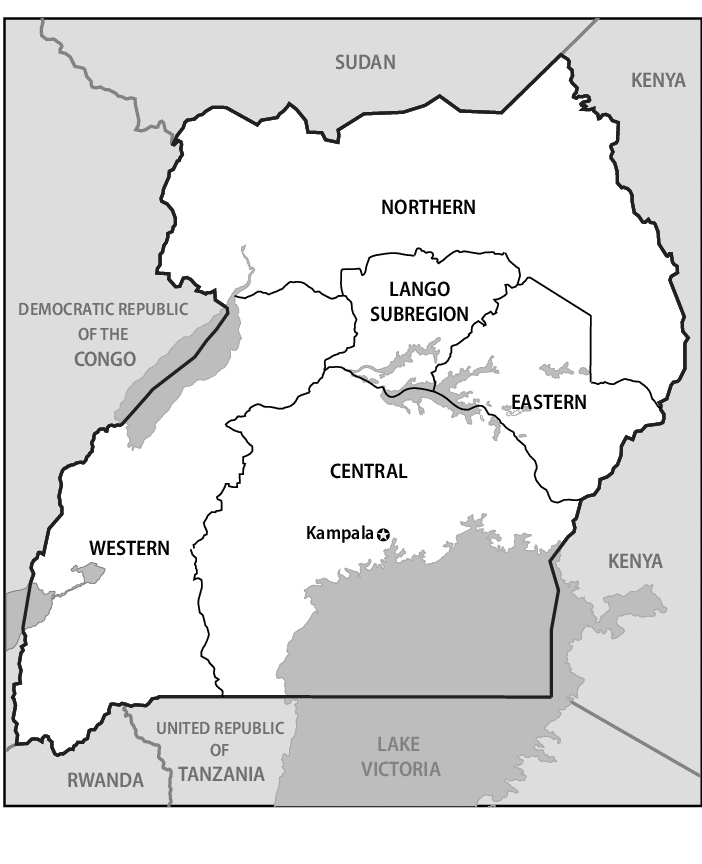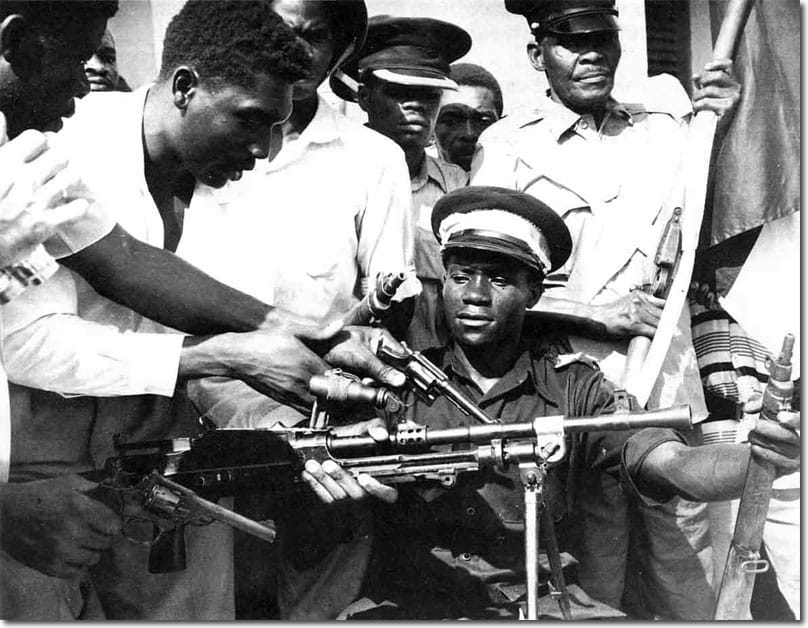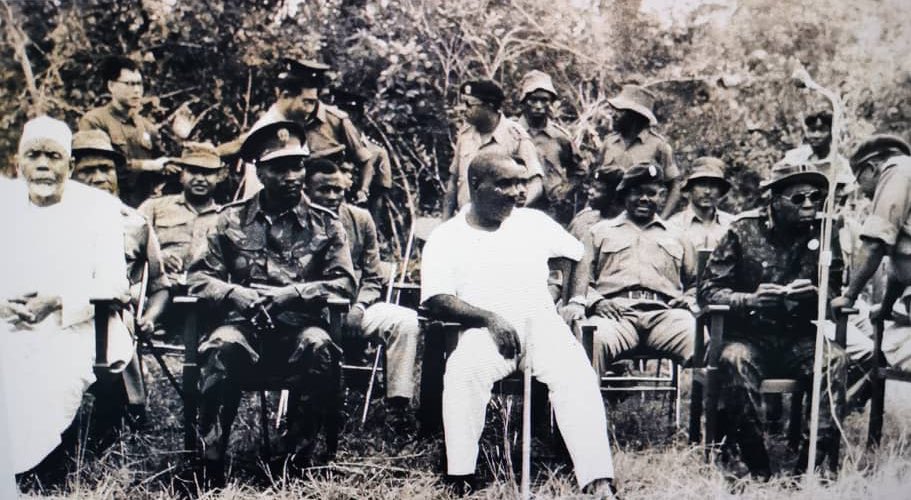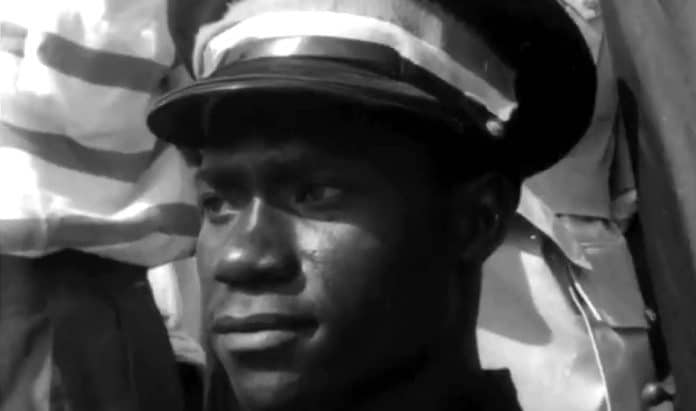John Okello Zanzibar Revolution and Ugandan Revolutionary Leadership
Fullname, “John Gideon Okello”, who lived between 1937 to 1971 was a revolutionist from Uganda and the 1964 Revolution of Zanzibar main leader. The coup overthrew Sultan Jamshid bin Abdullah and led to Zanzibar’s declaration of independence.
Biography
Early Life
There is very little information out there regarding John Okello’s youth: his birth is said to occur in a district called Lango, found in the then Uganda Protectorate, that was followed by baptizim when he turned two years old,

and Gideon was the name given to him. He was an orphan at the age of eleven and grew up with other relatives. At the age of fifteen, he left and began his own journey and found work in several places within East Africa. At different times, John Okello was a clerk, a servant, a gardener, and did a bunch of other odd work while traveling around East Africa, England, living at different times in Uganda, Kenya and Tanganyika. He later went on to become a mason. He was arrested in Nairobi, Kenya on a charge of rape and imprisoned for two years, leaving him with a deep hatred for the British. In 1959 Okello left for the island of Pemba, where he tried to find work in one of the fields. John Okello joined Sheikh Abeid Karume’s Afro-Shirazi Party. The party opposed the Arabs’ monopoly on the islands of Unguja and Pemba. A very charming individual, John Okello’ public statements always used to rebuke British colonial powers, people from the South of Asia particularly from the subcontinent of India that monopolized the commercial life of Zanzibar and people of Arabic ethinicity who dominated the political life of the Zanzibar Sultanate, won supporters among the African sultanate population. In 1961, the Arab-led National Patriotic Party won the election by a landslide, which convinced John Okello that only a radical revolution would give most Africans political power in Zanzibar.
Revolution
John Okello left for Zanzibar in 1963, where he contacted leaders of the Afro-Shirazi Youth Community, an Afro-Shirazi youth organization. The Youth League struggled to find a revolution to break the power of the Arabs. In Zanzibar, John Okello was a member of the Painting Association, since he was a painter, the job offered him a modest salary and allowed him to travel around the island, allegedly giving him chances to give speeches at the union branches, but in reality it was his way to organize a coup to overthrow the sultan. In his free time, he formed a small army of determined African patriots. This army was required to adhere to John Okello’s strict rules: abstinence from sex, no raw meat, and no alcohol.
John Okello, a very religious man, believed that he had been instructed in his dreams by God to break the Arab colonialism and build the revolutionary government

of Zanzibar and Pemba. John Okello also said that he received instructions from God, while still in Uganda, basing on how he saw the position of the stones in the stream. A day prior the launch of the coup, John Okello commanded his forces to murder all Arabs ranging between 18 to 25 years of age, but skip women who were pregnant and old, plus give mercy to virgins when it comes to raping.
Rebellion
On January 12, 1964, with the support of many Africans of the island’s origin, John Okello and his followers marched toward Zanzibar’s capital, Stone Town, where the sultan lived. Although poorly armed, John Okello and his men shocked the Zanzibar police force with a sudden attack and seized power.
During a radio talk show, John Okello called himself “Zanzibar and Pemba’s Field Marshall”. He ordered the Sultan to kill his own family and later commit suicide; otherwise, John Okello would have done it himself. However, the Sultan had already prepared his place of refuge and later escaped to England (Read “Zanzibar Revolution: Foreign Reaction and Legacy” to get better perspective of how foreign nations of interest to Zanzibar reacted to the revolution). The prime minister and other ministers did not escape and were given long prison sentences.
The coup caused quite a bloodshed of about 2,000 to 4,000 Arabs, South Asians and Comoros, whose families had been living in Zanzibar for centuries, between 18 and 20 January. In addition to the killings, John Okello’s supporters committed thousands of rapes and destroyed property and settlements. Within a few weeks, one-third of the population had died or fled.
Left Behind
John Okello set up the Revolutionary Congress whereby he received the title of Afro-Shirazi Party leader, Abeid Karume became the President and the (Arab) Umma-Massa Party leader, Sheikh Abdulrahman Mohammed Babu appointed the Prime Minister (and became Vice President in the coming years). Karume and Babu were both not included in the whole coup process as they were in Tanganyika

, but later on went back to Zanzibar, whereby the got a warm reception by John Okello. However, neither Karume nor Babu wanted to do anything with him. Later, John Okello appeared too weak to take on any role in the government of the new country and was quietly politically sidelined by Karume, who allowed him to remain in the post of Chief of Army Staff (He was known then as Field Marshal John Okello or General John Okello).
On 3 February Zanzibar was returning to normal and Karume had been accepted, of course, as president. John Okello formed a military force, known as the Freedom Military Force (FMF), from his supporters who were known for patrolling the streets and engaging in looting. In addition to Okello’s violent words, his heavy English pronunciations and his tribal language accent in English – a typical example of a Lango tribe from Northern Uganda, and his Christian faith, separated many in the muslim Zanzibar ASP. By March a large part of his FMF faction had been disarmed by Karume supporters and militants of the Public Party. Okello was barred from entering the country when he tried to return from a trip from the mainland and was deported to Tanganyika and then Kenya before returning, poor, to his native Uganda. As of March 11th, John Okello “Field Marshall” title was completely stripped from him.
The People‘s Liberation Army (PLA) was formed by the government in April and completed the disarmament of the remaining FMF forces of John Okello. On April 26, Karume announced that he was in talks to form a coalition with Tanganyika to form a new country, Tanzania. Karume’s reason for doing so may have been to prevent extremists from taking over the country or to reduce the possibility of increasing communist influence in East Africa. In addition, many of the Public Party’s socialist policies on health, education and social welfare were adopted by the government.
Conspiracies About John Okello Death
John Okello lived in Kenya, Congo-Kinshasa and Uganda. He was imprisoned several times and was last seen beside the then Ugandan President Idi Amin in 1971; he disappeared later. In Don Petterson’s book “Revolution in Zanzibar”, it is suspected that Idi Amin saw him as a threat (after Amin promoted himself, John Okello reportedly made a joke that “Two generals now exist in Uganda”) and decided to create an assassination plan. But about that joke, assuming “Field Marshall” John Okello was assassinated in 1971 (he officially met Amin in the same year of the revolution), it was at least a few years later that Amin was promoted to Field Marshal. But John Okello being of a Lango tribe, his popularity and charm, may be another reason for his astonishing disappearance.
Cultural References About John Okello
The black slave was played by Edward Roland in Werner Herzog’s 1972 film Aguirre, the Wrath of God is named “Okello”. In his commentary on the DVD version of the film, Herzog states that Aguirre’s own character was part of the John Okello character, with whom the director was in contact. (John Okello had asked Herzog to translate the book he had written.) Herzog explains: “I chose John Okello’s name because I owe him his madness, his excitement, and his negative thoughts to some extent in this film.”
if you would like to find more articles about The People Republic of Zanzibar, click here!


































